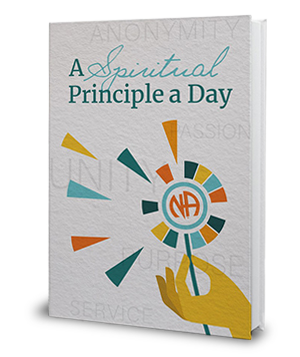Welcome to Narcotics Anonymous of NJ. Our Message Is…
That an addict, any addict can stop using drugs,
lose the desire to use, and find a new way to live.
Helpline
If you feel you have a problem with drugs, call our helpline
Events
See upcoming NA events and activities in NJ
Narcotics Anonymous is a nonprofit fellowship or society of men and women for whom drugs had become a major problem. We are recovering addicts who meet regularly to help each other stay clean.
– Narcotics Anonymous Basic Text, page 9
Recovery from addiction is possible and available through the 12 Steps and 12 Traditions of Narcotics Anonymous.
Narcotics Anonymous is FREEDOM from active addiction.
Narcotics Anonymous is an international, community-based association of recovering drug addicts with over 61,000 weekly meetings in over 131 countries worldwide.

Just for Today
If we're contemplating a relapse, we should think our using through to the bitter ends. For many of us, those ends would include severe medical problems, imprisonment, or even death. How many of us have known people who relapsed after many years clean, only to die from their disease?
But there is a death that accompanies a return to active addiction that may be worse than physical death. That is the spiritual death we experience when we are separated from our Higher Power. If we use, the spiritual relationship we have nurtured over the years will weaken and perhaps disappear. We will feel truly alone.
There is no doubt that we have periods of darkness in our recovery. There is only one way we can make it through those troubling times: with faith. If we believe that our Higher Power is with us, then we know that all will be well.
No matter how badly we may feel in our recovery, a relapse is never the answer. Together, we find recovery. If we stay clean, the darkness will lift and we will find a deeper connection to our Higher Power.
A Spiritual Principle a Day
Our interdependence and its significance become clear when we reflect on our group-level service. We come to see how our primary purpose feeds our mutual needs. "I need the group and the group needs me," as one member put it. Taken together, our individual contributions create a fertile atmosphere in which recovery blossoms. And we bloom, too, as our support for the necessary tasks of maintaining a group elevates our personal recovery.
Our own gut instinct may inspire some of us to get involved in service. For others, being cornered by a seasoned home-group member who doesn't let us run away after the "We're having a business meeting today!" announcement provides the inspiration. No matter what gets us to our first group business meeting--or any other service meeting--NA service can teach us a great deal about interdependence. As a group, we can't function without members performing necessary tasks. As individuals, contributing to those tasks improves our own functioning and emboldens us to recruit others to help carry the message. Offering our time, effort, attention, perspectives--and cornering other members--keeps us alive and focused on our primary purpose.
"I had less than two months clean when I went to my first group business meeting," an addict shared. "The group was voting on motions for the World Service Conference, and they asked my opinion, saying the newcomer perspective was important. It occurred to me that there were home groups like this all around the world, talking about the same issues and sharing their perspectives--I felt connected to NA in a big way."
Whether discussing global issues in the Fellowship or local ones, our voices as members and as groups are important. Each segment of our Fellowship does its part so that we, as members, have a place to share in carrying the message of hope and recovery. Our common welfare benefits from every contribution we make and every commitment we undertake. Embracing interdependence energizes unity and vitalizes our own well-being.

